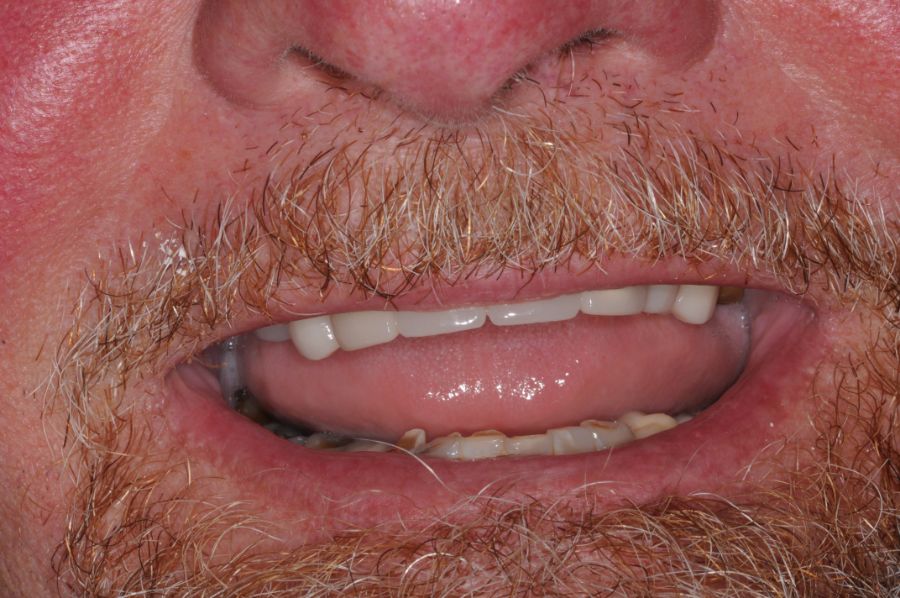 Before
Before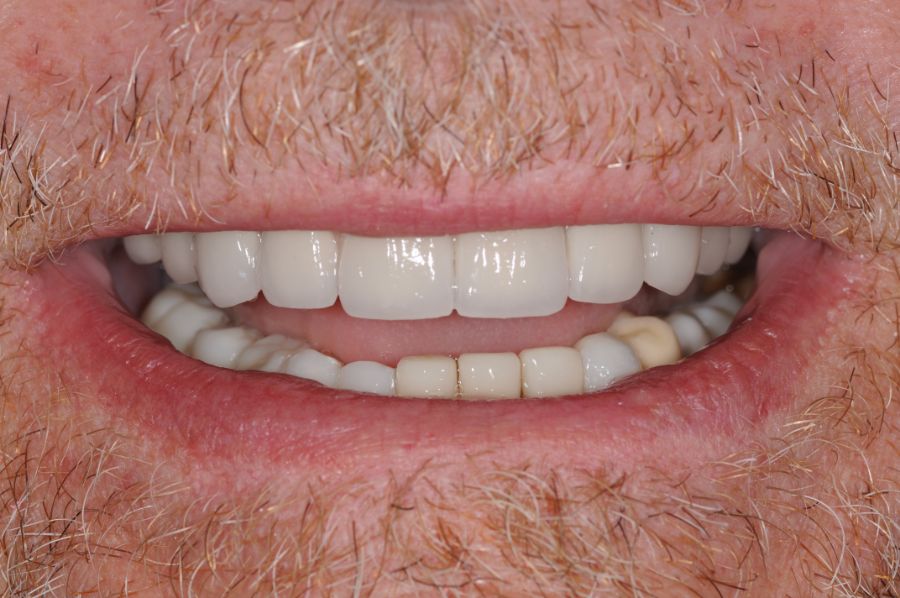 After
AfterDental implants go a step beyond traditional bridges and dentures by replacing an entire tooth from root to crown, creating a prosthetic that is the next best thing to nature when it comes to aesthetics, security, and durability. Whether you’re missing a single tooth or require a full denture, Dr. Spillman can use this state-of-the-art treatment to help you look and feel like your teeth never went missing in the first place. Your smile’s best days are ahead of you—contact us today to schedule a consultation to discuss replacing missing teeth with dental implants in Rockwall, TX.


A dental implant isn’t a replacement tooth, but rather a prosthetic root that is placed into the jawbone. Typically made of titanium because of its strength and biocompatibility, implants actually bond with the surrounding bone through a process called osseointegration, helping them provide a firm foundation for a crown, bridge, or denture that is attached on top. The two are connected using a metal abutment, allowing all the separate parts to function as a single, reliable tooth.

The team at Spillman Family Dental of Rockwall is dedicated to perpetually improving ourselves through continuing education, which is why we’re able to handle the entire implant procedure ourselves, including the surgical placement of the roots and attaching them to someone’s new teeth. This all-in-one approach saves patients a tremendous amount of time versus running between different dental offices, plus you’ll enjoy the peace of mind of working with the same trusted dentist and team throughout your entire implant journey.

Dental implants involve a multi-step process that can often take several months to finish. Although this might seem like a lengthy period, the numerous benefits that you’ll enjoy from this treatment will make it worthwhile. Since our staff performs the entire procedure in-office, you’ll be able to undergo every step of the journey with a team you already know and trust! Here are the four major steps that you can expect when replacing missing teeth with dental implants.

You’ll first go through an initial consultation with our dental team. During your visit, we’ll discuss your smile goals, look over your oral health, and evaluate your facial structure to determine if you’re a good candidate for dental implants. If so, we’ll also explain the entire process as well as the overall price of your treatment so that you know what to expect.
In some cases, patients may need preliminary treatments before they can undergo the implant surgery. These could include gum disease therapy, bone grafting, and tooth extractions. Once we’ve addressed any issues in your mouth, we can move forward with getting you your dental implants.

At the start of your procedure, our team will ensure to completely numb your mouth with a local anesthetic so that you’re pain-free throughout the appointment. We’ll also likely offer you sedation dentistry to further minimize discomfort and keep you relaxed during your visit.
Once you’re comfortable, we’ll start by making a tiny incision in the gums to access your jawbone, where we’ll place your implants in the preplanned angles and positions. Afterward, we’ll suture your gums closed around them and top them with protective caps so that they’re safe while you heal over the next few months.

During your recovery period, your implants will undergo a bonding process with your jawbone known as osseointegration. This is essential for creating an incredibly stable foundation for your restorations, that way they feel lifelike and won’t shift out of place when eating or speaking. Once this process is finished and successful, you’ll come back to our office so that our team can place your abutments atop your implants.

After your gums have healed from attaching your abutments, we’ll have you return to receive your new dental crown, bridge, or denture. Your dentist will make any necessary minor adjustments to your restorations to ensure that they match the rest of your smile and that you’re satisfied with the results. Once we’ve confirmed that your bite is comfortable, you’ll be free to show off your brand-new and functional teeth for many years to come.

We simply can’t overstate the benefits of dental implants in Rockwall. From the way they look to how they feel to the natural function they provide, dental implants mimic real teeth in nearly every way. It’s no wonder millions of Americans have chosen this solution to replace their lost pearly whites. Here are just a few of the unique advantages you can expect!




Dental implants can be a solution for an incomplete smile no matter how many teeth are missing. But should you use them to rebuild your own grin? Our team can help you answer that question; simply give us a call to schedule an appointment with us so that we can examine your jaw and discuss your specific needs. Once a decision has been made, we’ll put together your treatment plan and go over the steps of the process with you.

The most basic requirement for dental implants is that you need to have at least one tooth that’s either missing or needs to be extracted. Most adults are able to get dental implants as long as:
Don’t forget to ask about any preliminary treatments that could help improve your candidacy for dental implants.

The number of dental implant posts you need depends on how many teeth are missing. Of course, if you have only lost one tooth, then the math is straightforward: a single dental implant post can be placed in the gap. We’ll eventually anchor a crown to the implant in order to complete your grin.
A single dental implant topped with a crown is often seen as an alternative for a traditional dental bridge, which can only be placed once permanent changes have been made to the structure of your natural teeth.

After losing several teeth in a row, your first thought may be to get a dental implant to replace each one of them. But a more conservative solution exists: we can just place two dental implants in the gap to support a bridge. Said bridge will completely fill the space, and it will closely resemble your real teeth thanks to the materials that it’s made of.
It’s also possible to support a partial denture with dental implants if the teeth you lost were located in different parts of the same arch.
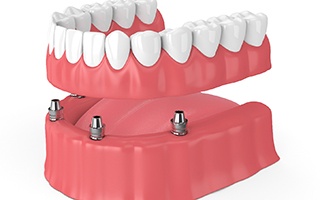
Full dentures are the traditional way to replace all of the teeth in your upper and lower jaw. However, you don’t have to settle for a denture that rests on your gums; instead, you can get one that’s attached to 4 to 6 implant posts, giving it superior chewing power and eliminating the risk of unwanted shifting or slipping.
When discussing the possibility of implant dentures, we’ll work with you to decide whether they should be removable or fixed. A removable implant denture will require fewer implant posts, but with a fixed one, you don’t have to worry about taking it out of your mouth to clean it.

Because dental implants are so versatile and can help patients dealing with any degree of tooth loss, each procedure has to be unique, so the cost is as well. Factors such as how many teeth are being replaced, where they are located in the mouth, and any treatments that need to be completed before placement (like gum disease therapy) will all influence the final price. However, thanks to their longevity and other numerous benefits, dental implants are widely considered one of the best investments in all of dentistry. They help patients save thousands in the long run compared to removable bridges and dentures because they don’t have to replace their new teeth nearly as often. Read on as we discuss some of the factors that determine the cost of dental implants in Rockwall

Before we begin to rebuild your smile, we need to make sure you’re a good candidate for dental implants. Many patients need to complete preliminary treatments like gum disease therapy, tooth extractions, or bone grafting before moving forward with dental implants. While these procedures will add to the length and cost of your treatment, they’re vital for maximizing the success of your new smile.
Then, the surgical placement of your dental implants will incur its own cost. The price of dental implant surgery will depend on factors like where in the mouth your implants are being placed and what type of sedation or anesthesia you’d like. Since we conveniently perform the entire treatment process right here in our Rockwall office, you’ll save time and money instead of visiting an unfamiliar specialist.

Aside from the process itself, your dental implants themselves will influence the cost of your treatment. When preparing your estimate, we’ll consider several important factors, such as:

It’s true that dental implants typically have a much higher initial cost than that of other tooth replacement options like dentures and dental bridges. However, they can easily become the more cost-effective solution in the long run! Dentures and dental bridges need to be replaced every several years. Combining this with the cost of occasional repairs and readjustments, these restorations can become quite costly over the years. On the other hand, the one-time cost of dental implants can give you a strong, healthy smile that lasts a lifetime and saves you thousands of dollars.

Every insurance policy is different, but most don’t cover the entire cost of dental implants. However, they usually cover select parts of the treatment, such as a percentage of the final restoration or a portion of any necessary preliminary procedures. Our talented team has years of experience navigating insurance benefits and helping our patients minimize their out-of-pocket expenses, and they’ll be happy to review the details of your policy during your consultation.

At Spillman Family Dental of Rockwall, we don’t want anything to stand between our patients and the strong, healthy smiles they deserve. That’s why in addition to dental insurance, we’re happy to accept financing through CareCredit. This third-party company offers low- to no-interest payment plans that can break up the cost of your dental implants into smaller amounts that fit into your monthly budget. You can apply for CareCredit here or give us a call and we’ll be happy to walk you through the process.

As the pinnacle of tooth replacement solutions, dental implants offer incredible benefits for both your oral and overall health that you can be sure to enjoy for many years to a lifetime! Even with their lifelike results and exceptional success rate, there’s always a rare chance that they could fail. This could be due to various reasons, including trauma and infection. If you notice any changes or complications that indicate a failed dental implant, make sure to come visit our team for salvage treatment. With the right measures, we can help preserve your newly rebuilt tooth.
Learn More About Dental Implant Failure & Salvage

Even those who are currently viable candidates for dental implants can still have a potential chance to undergo the treatment to rebuild their smiles. Our team provides a variety of preliminary services that can help ensure that the metal posts will stay in place without causing any complications in the future. Here are some of the different advanced dental implant procedures that can help set you up for a successful treatment.
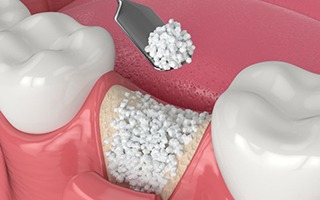
One of the most important factors for the longevity of your dental implants is that your jawbone density is sufficient. Not having enough bone tissue to support your metal posts can make it possible for them to loosen. Jawboned deterioration can sometimes happen because of tooth loss, due to a lack of stimulation from missing tooth roots. With bone grafting, our team can revitalize and strengthen your jawbone so that you can have adequate volume to hold your dental implants in position. The grafting material can come from another part of your mouth, a separate body part, or a donor, and it should take several months for it to fuse properly with your existing jawbone tissue.
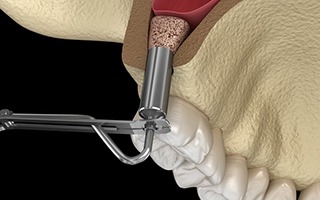
When it comes to embedding dental implants into your upper back jaw, our team will need to consider your sinuses and the placement of your metal posts. On top of there already being less bone density in this area, your sinuses can end up getting in the way of where you need to receive your new tooth roots. If this is the case, we can perform a sinus lift to provide additional bone tissue necessary for your metal posts. We’ll start by making an incision in your upper gums to access the jawbone before lifting the membrane of the sinus cavity to place the grafting material in the space. This helps thicken your jawbone and prevents your sinuses from getting damaged when the dental implants are placed. It should take anywhere between 4-12 months for you to completely heal.
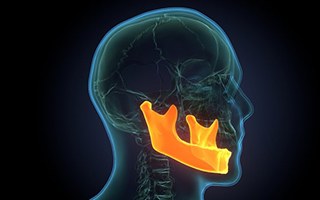
Those with jawbones that aren’t wide enough may require a ridge expansion procedure. This treatment involves using specialized tools to divide some of the jawbone—creating an inner and outer area. Our team will then place grafting materials into the wedge to widen the area, making it denser. After you’ve recovered entirely, you can be ready to undergo the dental implant process to renew your smile!

Our dentists are trained to place dental implants entirely in-house, which means you can complete your tooth replacement procedure with the dental professionals you already know and trust. It also means you’ll speak with them about essential post-op instructions to follow immediately after your dental implant surgery. By doing so, you can avoid complications or hiccups in your recovery, ensuring your mouth stays healthy as it heals over the next several months.

As your gum tissue begins to heal around your implant, a blood clot should begin to form. This is an incredibly important part of your healing process as it protects the vulnerable areas of your mouth and ensures the dental implant remains secured in place. For that reason, be sure to follow the steps below:

It’s normal to experience side effects following dental implant surgery, including swelling, intermittent bleeding, and general discomfort. However, these side effects should go away after a few days to a week at most. To manage your symptoms, take painkillers as prescribed, apply a cold compress to your face to reduce swelling, and replace gauze pads regularly as they absorb blood from your implant site.

The day of your surgery, you’ll want to make sure you have foods available at home that require virtually no chewing. Fruits and veggies to make smoothies, low-sugar yogurts, applesauce, mashed potatoes, cold soups, pudding, and ice cream are all great options. After a couple days, you may be able to upgrade to fork-tender foods, such as meatloaf, scrambled eggs, and soft-cooked pasta. Once the soft tissue in your mouth has healed, you should be able to eat regular foods. Avoid hard or crunchy foods until advised by our team that it’s safe to consume them.

You will be able to brush and floss normally after your dental implant surgery. However, you will want to avoid the surgical site while performing oral hygiene to ensure the stitches do not become loose or come out. To manage swelling and inflammation, use an oral mouth wash or saltwater mixture to clean the treatment area. Avoid oral rinses that contain alcohol as these can lead to dry mouth.

Once your implant crown, bridge, or denture is placed, you may notice a little tenderness around your gums. This is a normal reaction and will go away with time. However, if you notice bleeding or major discomfort, get in touch with our office right away.

Your dental implant is designed to last for decades (and can even last for life in certain cases), but it really depends on how well you take care of it day-to-day, just like your natural teeth. The more steps you take to give your smile the protection it needs, the better off you’ll be in the long-term. Below, you can look over the most essential steps to keep in mind following your implant procedure. If you need additional guidance on maintaining your dental implants, our team members at Spillman Family Dental of Rockwall are just a phone call away!

Brushing twice a day with fluoridated toothpaste and flossing at least once a day will keep food debris from collecting on your dental implant as well as dramatically reduce plaque production. While the restoration that sits atop your implant will not develop decay like your natural teeth, the gum tissue supporting the implant can easily become infected if it’s not well protected daily. For a more thorough cleaning, we recommend adding an oral rinse to your hygiene routine.

The foods you eat can have an impact on your oral health just as much as how often you brush and floss. Eating foods high in sugar and starch make it much easier for oral bacteria to produce plaque acids throughout the day, while eating healthy options like fruits and vegetables can naturally scrub your teeth of loose food debris and contain vitamins and minerals that promote positive oral health. Consider taking a closer look at your diet to make sure it’s balanced.

Dental implants are far from indestructible, despite being incredibly durable and long-lasting. That means poor habits that damage natural teeth can easily harm dental implants as well, including:
The best thing you can do is find a replacement for these poor habits quickly. Feel free to talk with our team or your general physician if you need guidance.

Are you someone who enjoys staying active, particularly by playing sports? Having the right protection is essential for many reasons, whether you’re playing football, basketball, soccer, hockey, or another sport. For that reason, you’re better off using a custom-made mouthguard to prevent serious oral injury to your dental implants and any remaining teeth you have. Furthermore, if you suffer from chronic teeth grinding and clenching (or bruxism), a nightguard can provide a reliable cushion for your teeth as you sleep throughout the night.

Maintaining checkups and cleanings every six months with our office is incredibly important for a few reasons. Not only can we confirm that your current oral care routine is working, but we can catch any underlying issues before they have a chance to cause harm to your smile. We can also evaluate the status of your dental implant and make sure no problems are present with its integration inside your jawbone.
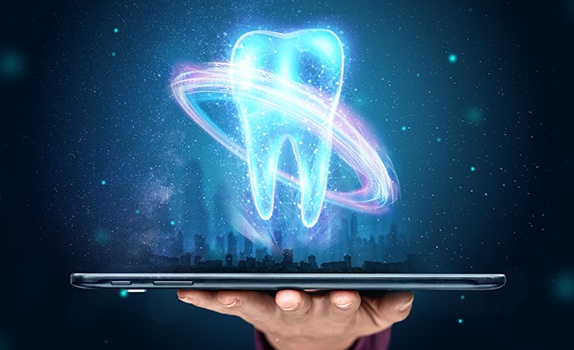
Dental techniques and technology are becoming more and more advanced. Today, we use a wide range of techniques to make dental implant placement as successful as possible. Continue reading to learn more about some of the pieces of technology we have here at Spillman Family Dental.

Dental X-rays are used to help dental professionals see the oral structures of the mouth that are hidden or difficult to see with the naked eye. This includes the roots of the teeth and jawbone. However, X-rays can’t capture everything. That’s why we also map out your mouth with the 3D cone beam CT scanner. This technology helps by showing up important details that aren’t always apparent with X-rays. This includes nerve pathways, blood vessels, and the thickness of your jawbone. With this scanner, we can plan where your dental implants should be placed for the highest possibility of success.
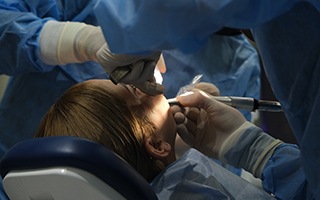
Using the CBCT scan of your mouth, we can create a 3D-printed surgical guide. This helps us have a clear indication of where your dental implants need to be placed. It provides an enhanced precision that makes your treatment more comfortable and reduces inflammation and bruising. Treatments performed with a surgical guide tend to require smaller incisions, meaning an easier recovery time following your surgery.

Infection is the leading cause of dental implant failure! This happens when harmful bacteria attach themselves to the tissue around an implant and cause damage. This makes the implant lose its base of support. Maintaining an excellent oral hygiene routine is an important step to prevent infection from developing. We take this a step further by adding an antibacterial coating on the dental implants. This helps to kill some of the harmful bacteria to promote healing and keep the area healthy.
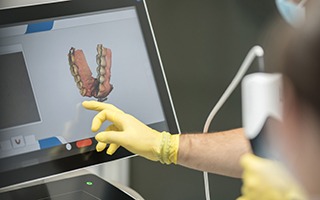
If you have had impressions taken for orthodontic work, restorations or other dental treatments, you likely remember it involving a mouthful of gooey putty. Fortunately, we don’t use this material to make impressions anymore. We use digital impressions. They are easier to take and produce highly accurate and reliable images. This simplifies the process of providing patients with high-quality, perfectly fitting restorations.

If you’re considering tooth replacement, we want you to be as informed as possible on which treatment can best suit your needs. Whether you’re replacing single or several teeth, we encourage you to ask any questions you may have about dental implants and their many benefits. While you’ll have time to address concerns during your consultation, you can also review some of our most commonly asked questions below to learn more.
Dental implant failure is an extremely rare occurrence, but it can happen. If it does, it’s usually for one of two reasons: peri-implantitis (an infection) or failed osseointegration. While peri-implantitis is a form of gum disease that damages the bone and gums supporting the implant, failed osseointegration occurs when the implant fails to fuse with the implant to begin with. If you had low jawbone density prior to surgery, you’re more likely to experience this complication. Other notable causes of failed dental implants include chronic teeth grinding, using tobacco, having poor oral hygiene, and certain medical conditions like diabetes, cancer, autoimmune disorders, or osteoporosis. Our team will make sure you are eligible to receive dental implants before beginning treatment as well as offer guidelines for minimizing your risk for implant failure.
While it depends on how many implants you are receiving at a time, placing a single implant takes between one and two hours. Keep in mind this time is also set aside to create a sterile surgical atmosphere and administer anesthesia. If you are also receiving sedation dentistry, we would provide it during this time as well.
We capture detailed impressions of your mouth, then use this data to design your permanent restoration that attaches to your dental implant. After the restoration is placed, no one should be able to tell that you even received a dental implant. Remember, implants are essentially prosthetic roots inside the jaw. You will not have to hold your jaw in any strange or peculiar way just to keep it from shifting around (something that is very common for poorly-fitting dentures).
Dental implants are not made from enamel, which means they cannot develop cavities. However, your remaining teeth can still develop cavities as well as the gum tissue surrounding the implant site. For that reason, you will still need to practice routine brushing and flossing every day to keep your dental implants healthy.
Over the first couple weeks after your surgery, certain foods are going to become harder to chew. Avoid alcohol, sugary, or acidic beverages. Do not use a straw until your treatment site has fully healed. Once your healing period is complete and your implant is restored, you should be able to eat just about anything you’d like without much worry. However, some very sticky or chewy foods can loosen or dislodge your restoration. Use caution if eating these items or avoid them entirely.
Luckily, dental implant placement doesn’t hurt. Our dentists will numb your mouth before treatment begins. That way, your body won’t sense any pain from the procedure. The most you’ll feel is slight pressure as our team works on the treatment site.
That said, your mouth may feel sore after the surgery. (The anesthetic will eventually wear off, after all.) You’d be wise to take prescribed or store-bought pain relievers as directed. Fortunately, the aches should fade after two or three days. Call our office if they don’t or if they worsen instead.
Implant surgery is a bit invasive, but recovering from it involves little time. Ideally, you’ll be well enough to resume normal activities the day after it’s done.
Of course, you still need to exercise caution as you heal. Therefore, avoid strenuous exercise for the first week after surgery. Watch for signs of bleeding and swollen gums as well. (You can use gauze and cold compresses for these symptoms.) Also, take prescribed or store-bought pain relievers as needed.
While the surgery’s recovery time is short, implant fusion takes longer. You’ll likely need six months before your implants fully fuse with your jawbone.
Compared to other restorations, dental implants are highly successful. Their success rate is over 95%, even ten years after initial placement.
Still, how well your implants function will depend on how you care for them. It’s thus crucial that you maintain them with the following:
As a matter of fact, yes – dental implants do make you look younger. In particular, they keep your cheeks from turning hollow and sunken.
You see, your jawbone depends on teeth for stimulus. The force of biting and chewing helps preserve its bone tissue. When you lose a tooth, the jawbone loses that stimulation and deteriorates. You’ll then suffer facial collapse if it’s left untreated.
Thankfully, dental implants prevent such facial collapse. They’re the only replacement teeth that can stimulate the jawbone. As such, they prevent the bone atrophy that makes you look older.
I Need a Dental Checkup & Cleaning I Have a Cavity or Broken Tooth I am Missing One or More Teeth I Want to Improve My Smile I am Anxious/Afraid of the Dentist I Want Straighter Teeth I am Worried About Bleeding Gums I am in Pain & Need Help View Our Services